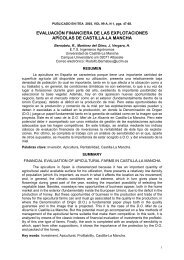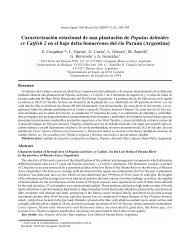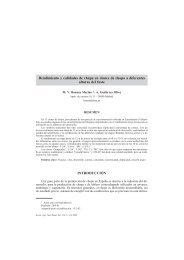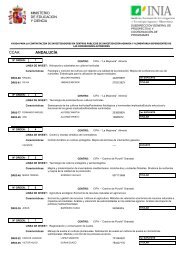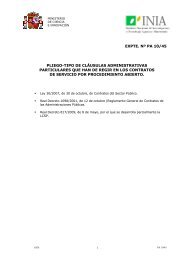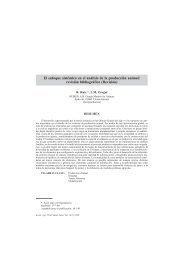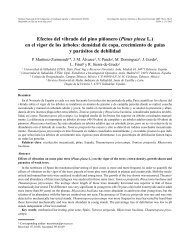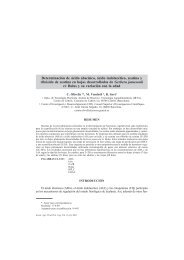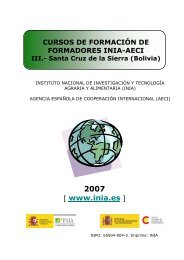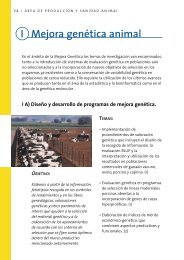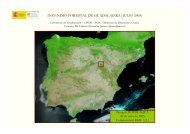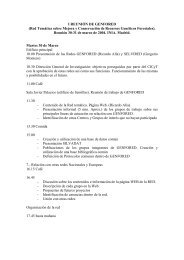Status of medicinal and aromatic plants in - Inia
Status of medicinal and aromatic plants in - Inia
Status of medicinal and aromatic plants in - Inia
Create successful ePaper yourself
Turn your PDF publications into a flip-book with our unique Google optimized e-Paper software.
PRESENTED PAPERS 51<br />
• Factors play<strong>in</strong>g a role <strong>in</strong> the decrease <strong>of</strong> the Hungarian MAP production potential <strong>and</strong><br />
biodiversity<br />
The scientific study <strong>of</strong> the Hungarian <strong>in</strong>digenous flora has a long tradition. However the<br />
detailed study <strong>of</strong> populations utilized as MAPs (coenological, chemical <strong>and</strong> yield characters<br />
was undertaken only recently, <strong>in</strong> the early 1960s. This seems to be a very important<br />
phenomenon, especially <strong>in</strong> the case <strong>of</strong> <strong>medic<strong>in</strong>al</strong> <strong>plants</strong> which became protected or<br />
endangered. On the basis <strong>of</strong> recent <strong>in</strong>vestigations, the factors hav<strong>in</strong>g an adverse effect on<br />
MAP productivity can be divided <strong>in</strong>to two ma<strong>in</strong> groups:<br />
1. Direct factors limit<strong>in</strong>g the spectrum <strong>and</strong> productivity <strong>of</strong> <strong>in</strong>digenous MAP populations<br />
- Overexploitation <strong>of</strong> MAP populations by <strong>in</strong>tensive <strong>and</strong> <strong>in</strong>considerate collect<strong>in</strong>g may<br />
result <strong>in</strong> irreversible damage. Ow<strong>in</strong>g to pr<strong>of</strong>it seek<strong>in</strong>g <strong>and</strong> lack <strong>of</strong> scientific control, more<br />
<strong>and</strong> more species have to be <strong>in</strong>cluded <strong>in</strong> the list <strong>of</strong> endangered species. Examples <strong>in</strong>clude<br />
Adonis vernalis, Primula spp. <strong>and</strong> Dictamnus albus, which became protected due to their<br />
unregulated exploitation from the wild.<br />
- The overall reduction <strong>of</strong> forest areas result<strong>in</strong>g from progressive <strong>in</strong>dustrialization limits<br />
both the spectrum <strong>and</strong> productivity <strong>of</strong> MAP populations. The decrease <strong>in</strong> the populations<br />
<strong>of</strong> Dryopteris filix-mas, Crataegus nigra, Primula vulgaris, Veronica <strong>of</strong>fic<strong>in</strong>alis, etc., can be<br />
expla<strong>in</strong>ed by this phenomenon.<br />
- Dra<strong>in</strong>age <strong>of</strong> marshy-moist ecosystems as a result <strong>of</strong> the political decision <strong>of</strong> the former<br />
socialist adm<strong>in</strong>istration (especially <strong>in</strong> the 1950s) has had an adverse effect on the<br />
<strong>medic<strong>in</strong>al</strong> plant populations after many years. The most valuable species <strong>in</strong> this respect,<br />
which have had to be removed from the list <strong>of</strong> utilized <strong>plants</strong>, are Acorus calamus <strong>and</strong><br />
Menianthes trifoliata.<br />
- There are huge losses to former ruderal MAP populations, gathered from cultivated field<br />
headl<strong>and</strong>s, meadows, farmyards, etc. The biodiversity <strong>of</strong> these systems has been reduced<br />
drastically. Species which were collected from these habitats on a large scale, such as<br />
Marrubium vulgare <strong>and</strong> Fumaria schleicheri, have become very rare <strong>and</strong> botanists consider<br />
there is a need for their protection.<br />
- The natural distribution <strong>of</strong> MAPs is limited by pollution. Because <strong>of</strong> the <strong>in</strong>creas<strong>in</strong>g<br />
quality requirements, the production area has to be farther from the ma<strong>in</strong> roads,<br />
<strong>in</strong>dustrial facilities, etc. This means that more <strong>and</strong> more territories are withdrawn from<br />
the production <strong>of</strong> <strong>medic<strong>in</strong>al</strong> <strong>and</strong> <strong>aromatic</strong> <strong>plants</strong>. Some species, especially Arnica montana<br />
<strong>and</strong> Vacc<strong>in</strong>ium spp., are very susceptible to pollution.<br />
2. Indirect factors limit<strong>in</strong>g the spectrum <strong>and</strong> productivity <strong>of</strong> <strong>in</strong>digenous MAP populations<br />
The overall reduction <strong>in</strong> the species range <strong>in</strong> natural plant communities, which is a general<br />
phenomenon throughout Europe (<strong>plants</strong> becom<strong>in</strong>g endangered, rare or ext<strong>in</strong>ct) is also<br />
observable <strong>in</strong> Hungary. Medic<strong>in</strong>al <strong>and</strong> <strong>aromatic</strong> <strong>plants</strong>, as constituents <strong>of</strong> the different<br />
ecosystems, are affected by any factor that damages <strong>plants</strong> generally. The severe reduction<br />
<strong>of</strong> biodiversity affects all Europe <strong>and</strong> is reflected <strong>in</strong> the large number <strong>of</strong> species now ext<strong>in</strong>ct<br />
(Bernáth 1988). This reduction also means the ext<strong>in</strong>ction <strong>of</strong> some chemotaxa exist<strong>in</strong>g <strong>in</strong><br />
given natural systems, which may have had potential therapeutic use but are lost forever.<br />
Several <strong>in</strong>direct factors such as <strong>in</strong>dustrial pollution, <strong>in</strong>creas<strong>in</strong>g amount <strong>of</strong> agrochemicals,<br />
harmful human <strong>in</strong>fluences, etc., damage the natural ecosystems cont<strong>in</strong>uously, <strong>in</strong>clud<strong>in</strong>g<br />
plant species utilized as MAPs.




